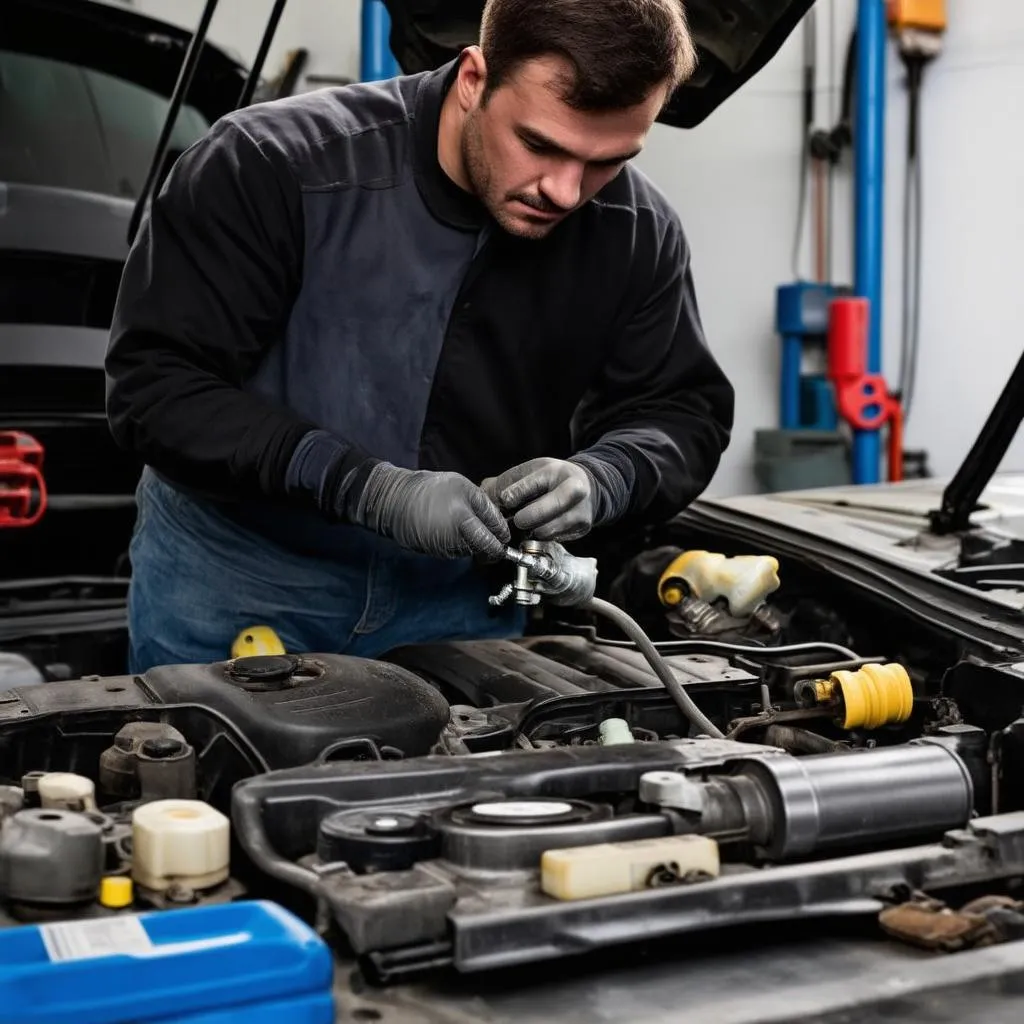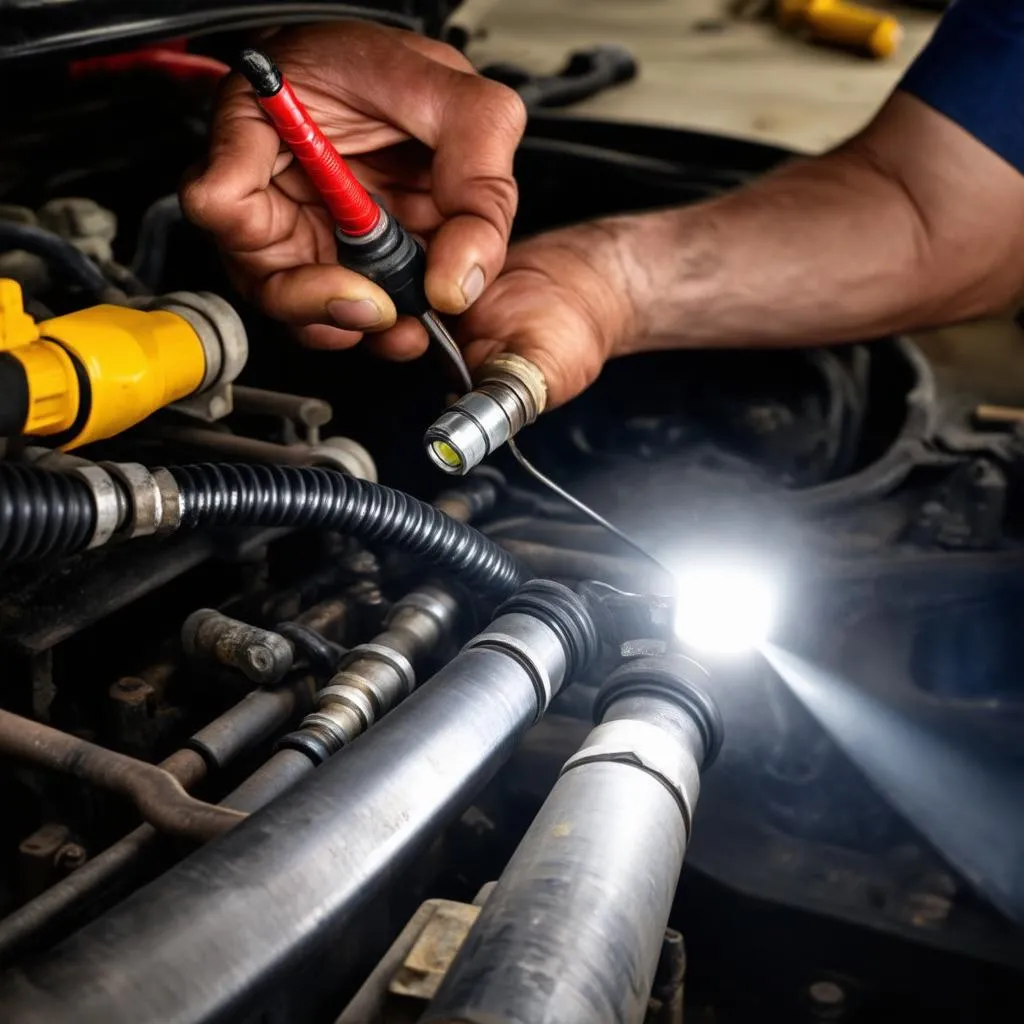Imagine this: you’re cruising down the Pacific Coast Highway in your sleek 2015 Audi A4, the California sun warming your face. Suddenly, your engine sputters, the “check engine” light flashes ominously, and your dream drive turns into a roadside nightmare. You plug in your trusty OBD scanner and up pops the cryptic message: “Code P0087”. What does it mean? More importantly, what do you do about it?
Don’t panic! This scenario, while stressful, is all too common for car owners. The dreaded “check engine” light can signal anything from a loose gas cap to a serious engine problem. Understanding OBD codes like P0087 is crucial to deciphering your car’s cry for help and getting back on the road.
Unmasking the Culprit: Understanding OBD Code P0087
In the world of automotive diagnostics, “P0087” translates to “Fuel Rail/System Pressure – Too Low”. Let’s break down what that means from different perspectives:
The Mechanic’s Viewpoint: Experienced mechanics like Robert Hernandez from Hernandez Auto Repair in Austin, Texas, often see P0087. “This code indicates a problem with the fuel delivery system’s ability to maintain the correct pressure,” explains Hernandez. “It could point to a failing fuel pump, a clogged fuel filter, or even a problem with the fuel pressure regulator.”
The Technical Perspective: Your car’s engine needs a precise mixture of fuel and air to run smoothly. The fuel rail system, responsible for delivering fuel to the engine, operates within a specific pressure range. When the pressure drops below this range, usually due to insufficient fuel flow, the Engine Control Unit (ECU) throws the P0087 code.
The Economic Impact: Ignoring a P0087 code can be costly. Driving with low fuel pressure can lead to reduced engine performance, poor fuel economy, and even catastrophic engine damage in extreme cases.
Navigating the P0087 Maze: Common Symptoms and Causes
You might be wondering, “How do I know if I have a P0087 problem?” Besides the illuminated “check engine” light, here are some telltale signs:
- Engine Hesitation or Stalling: Your engine might hesitate or stall, especially during acceleration or when under load.
- Rough Idling: The engine might run rough or vibrate excessively when idling.
- Reduced Fuel Efficiency: You might notice a significant drop in your car’s miles per gallon.
- Difficulty Starting: The car might take longer than usual to start or might not start at all.
Why does this happen? Several culprits could be responsible for triggering the P0087 code:
- Faulty Fuel Pump: The fuel pump is the heart of the fuel system, responsible for drawing fuel from the tank and delivering it to the engine. A weak or failing fuel pump can’t maintain adequate pressure.
- Clogged Fuel Filter: Over time, the fuel filter can become clogged with dirt and debris, restricting fuel flow and causing pressure drops.
- Malfunctioning Fuel Pressure Regulator: This component regulates the pressure of fuel delivered to the engine. If it fails, it can cause pressure inconsistencies.
- Leaking Fuel Lines or Injectors: Any leaks in the fuel system, be it in the lines or the injectors, can lead to pressure loss.
- Electrical Issues: Problems with wiring, connectors, or sensors related to the fuel system can disrupt its operation.
Taking Charge: Troubleshooting and Fixing P0087
Addressing a P0087 code involves a systematic approach to identify and rectify the root cause:
- Read the Code: Begin by using an OBD-II scanner to confirm the presence of the P0087 code and check for any other accompanying codes that could provide additional clues.
- Check for Obvious Issues: Inspect for loose gas caps, damaged fuel lines, or visible fuel leaks.
- Inspect the Fuel Pressure: Use a fuel pressure gauge to check the fuel pressure at the fuel rail. Compare the readings to the manufacturer’s specifications.
- Test the Fuel Pump: Listen for the fuel pump’s priming sound when you turn the ignition key. If you don’t hear it, check the fuel pump relay and fuse. You might need to test the fuel pump’s electrical circuits and pressure output.
- Inspect the Fuel Filter: Consider replacing the fuel filter if it hasn’t been changed recently, as a clogged filter can significantly restrict fuel flow.
- Examine the Fuel Pressure Regulator: Check the fuel pressure regulator for signs of damage or malfunction. If necessary, test its operation or replace it.
- Address Electrical Issues: Inspect the wiring, connectors, and sensors related to the fuel system for any damage, corrosion, or loose connections.
 Fuel Pump Replacement
Fuel Pump Replacement
Seeking Professional Help: While some DIY enthusiasts might be comfortable tackling these repairs, it’s often best to consult a qualified mechanic, especially for complex issues like fuel system diagnostics and repairs.
Preventing Future Fuel System Woes
Like any complex system, your car’s fuel system benefits from regular maintenance to prevent future problems:
- Regular Fuel Filter Replacements: Adhere to your car manufacturer’s recommended fuel filter replacement intervals.
- Quality Fuel: Using high-quality fuel from reputable gas stations can help prevent fuel system contamination.
- Addressing Issues Promptly: Don’t ignore warning signs like rough idling, hesitation, or the “check engine” light. Early detection and repair can prevent minor problems from escalating into major headaches.
Beyond P0087: Exploring Related Fuel System Codes
The P0087 code is just one piece of the fuel system puzzle. Other related codes you might encounter include:
- P0088: Fuel Rail/System Pressure – Too High
- P0089: Fuel Pressure Regulator 1 Performance
- P0090: Fuel Pressure Regulator 1 Control Circuit
 Mechanic Inspecting Fuel Lines
Mechanic Inspecting Fuel Lines
Do you have other car trouble codes bothering you? Check out our in-depth article on 2012 Mini Cooper Clubman S OBD Code P0087 for a specific example of how this code can manifest. You can also find more information about OBD P0087 on our website.
Need Expert Assistance? We’re Here to Help!
Dealing with car troubles can be frustrating and overwhelming. If you’re facing a P0087 code or any other automotive issue, don’t hesitate to reach out. Our team of automotive experts is available 24/7 to provide guidance and support. Contact us via WhatsApp at +84767531508 for immediate assistance with diagnostic tools, repair advice, or any other car-related questions you might have.
Remember, a well-maintained car is a happy car. Stay informed, address issues promptly, and enjoy countless miles of smooth driving!
